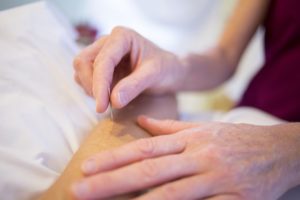There is a lot of outrage and unkindness in our country, today more than ever. I get it. The polarization in the United States has come down to people not being able to have a meal with family members who share a different political viewpoint, others in an uproar about wearing or not wearing a mask and the fight over vaccinations to bring this pandemic under control. It’s disheartening.
Some of my blog posts are reprinted by other outlets, including national news organizations, where there is opportunity for online comments.  Lately, I’ve seen what has morphed from helpful comments on my posts to online screeds about vaccines, the pandemic hoax and profanities about our current president. Recently, a pretty innocuous post about nutrition received the usual comments about vaccines, etc. but the comments also went on to question whether being an acupuncturist qualifies one to write such an article.
Lately, I’ve seen what has morphed from helpful comments on my posts to online screeds about vaccines, the pandemic hoax and profanities about our current president. Recently, a pretty innocuous post about nutrition received the usual comments about vaccines, etc. but the comments also went on to question whether being an acupuncturist qualifies one to write such an article.
I usually ignore these kinds of snarky comments, but this last batch on whether an acupuncturist was qualified to write about nutrition made me realize that the general public likely doesn’t know much about how an acupuncturist is trained and what they really know. So let me fill you in.
Your acupuncturist* has a master’s degree or a doctorate and has passed several licensing exams. Along with learning about Chinese medical theory, needling techniques, accessory therapies, herbal medicine and acupuncture clinical medicine, your acupuncturist also studied Western medicine at the same time. They have spent thousands of hours in the classroom and several hundred hours in the teaching clinic. Their Western medical education includes:
- Anatomy
- Physiology
- Pathophysiology
- Emergency medicine
- Western medical screening
- Western medical terminology
- Nutrition
- Pharmacology
- Drug and herb interactions
- CPR
- Asepsis (working in a germ-free space)
- Western blood-borne diseases
Your acupuncturist learned two medical systems side-by-side; Western and Asian medicine. They are able to recognize a medical emergency and when to refer their patient to a Western health provider. In fact, one of my most rewarding moments as a practitioner was when I convinced a patient to seek emergency care for what I thought were alarming symptoms. This patient had been ignoring and minimizing their symptoms for days, despite family members’ urging them to go to the doctor. Based on my concern, this patient immediately sought out care. Weeks later, I received a call from the patient’s family thanking me, as their loved one had been having a heart attack and survived.
received a call from the patient’s family thanking me, as their loved one had been having a heart attack and survived.
When your acupuncturist is also trained as an herbal practitioner (and most are), then they probably know more about herb and drug interactions than your Western doctor. And because many herbs are also foods, they know a lot about the properties of food, nutrition and healing illness through food therapy. In many states acupuncturists are considered to be primary care providers, and in several states they can order lab tests for the purpose of functional medicine diagnostics.
The bottom line is that your acupuncturist knows more than you think. And while I don’t usually respond to online comments that are meant to be hurtful, it believe that it’s important for the public to understand just how much education and clinical experience your licensed acupuncturist (LAc) has to have in order to practice acupuncture. I also don’t respond to snarky online comments because it just inflames peoples’ misplaced outrage. And let’s face it; outrage is exhausting and not good for your health.
*In this post, I’m talking about the education requirements for Licensed Acupuncturists, not chiropractors, physical therapists, massage therapists or other practitioners who have certifications to perform acupuncture or dry needling.



